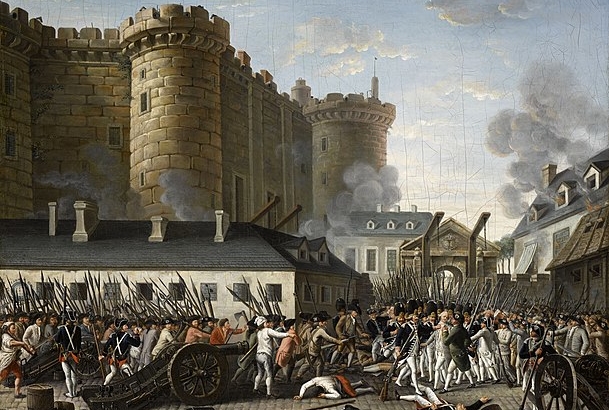U.S. Constitution’s Presidential Limits: The Framers’ Opposition To King Louis XIV “I Am the State” Monarchy Into Despotism
Though the words attributed to King Louis XIV are apocryphal (they don’t appear in print attributed to him until decades after his death), they present a chilling picture of the danger of absolute monarchy to individual freedom, and it should come as no surprise that the French had a revolution, and then a series of power struggles, starting at the end of the 18th century and for almost a century after.
In the wake of our own revolution, our founders, and then those who became the architects of our constitutional republic, were rightly worried about the descent from a free people into monarchy, and the further descent from monarch, to absolute monarch, to despotism.
As historian Arthur Schlesinger, Jr., wrote, “The power to do good meant also the power to do harm, the power to serve the republic also meant the power to demean and defile it,” and in the proximate sense of the founding, they had history from which they could draw. In 1974, Professor Raoul Berger wrote, “the Framers were steeped in English history; the shades of despotic kings and conniving ministers marched before them.”
But they could also look to the reign of King Louis XIV—his consolidation of power, his undermining of the potential for opposition, and his creation of a civil service corps personally loyal to him—to see the dangers of centralized executive power.
Law professor Jonathan Turley has written extensively about this, especially with regards to our present executive branch and its largely unaccountable administrative state, saying:
“The growing dominance of the federal government over the states has obscured more fundamental changes within the federal government itself: It is not just bigger, it is dangerously off kilter. Our carefully constructed system of checks and balances is being negated by the rise of a fourth branch, an administrative state of sprawling departments and agencies that govern with increasing autonomy and decreasing transparency.”
What Professor Turley is saying is that without adherence to the system of checks, balances, and a diffusion of sovereign power, this lack of transparency and increased autonomy is dangerous to individual rights.
In Federalist 68, 69 and 70, Alexander Hamilton further discusses the concerns (both real and imagined) with a strong governmental executive in making the case for the Constitution’s constraints against a President’s powers. In Federalist 70, he invokes the ghosts of Imperial Rome:
“Every man the least conversant in Roman story, knows how often that republic was obliged to take refuge in the absolute power of a single man, under the formidable title of Dictator, as well against the intrigues of ambitious individuals who aspired to the tyranny, and the seditions of whole classes of the community whose conduct threatened the existence of all government, as against the invasions of external enemies who menaced the conquest and destruction of Rome.”
While Hamilton was referencing Rome, he could also have been talking about the excesses of the court of Louis XIV in France—and also warning against the converse, the dangers of a weak president.
The key was to weigh the powers of a reasonably strong executive, and executive branch, against the checking powers of the other two branches. This was the focus of both Federalist 68 and 69, in which Hamilton details how the President, as envisioned by the proposed Constitution, differs markedly from monarchs, and monarchies, of all kinds.
It starts with the simple—in Section 1 of Article II, the President’s term is limited to four years, and with the ratification of the Twenty-second Amendment in 1951, the President was limited to two terms in office. So, unlike a king, a president’s time in power is limited.
Then, the engineering of a presidency balanced between strength and limitation gets more complicated. The President can appoint senior officials including cabinet members and Supreme Court justices, but these positions have to be confirmed by a vote of the Senate. So again, unlike a king, the President cannot merely pick individuals who are personally loyal to him—they have to be picks that will satisfy a majority of the members of the Senate as well.
The President is commander-in-chief of the United States Military. But the President cannot declare war; only Congress can. Yes, the President can engage in limited military action, if such a response is immediately necessary, but if this action is going to go more than several months, Congress must have its say. Congress also controls the budget. This is an enormous check both on the power of a President to wage war, and also on the President’s ability to engage in other policymaking.
Most importantly, unlike most monarchies absolute or otherwise, Congress has the power to remove a President from office via an impeachment for “high crimes and misdemeanors.” King Louis XIV expended a great deal of energy in working to ensure that his aristocracy could not undermine his regal powers and to make sure that France did not descend into civil war.
In America, the power of impeachment works to ensure that a President doesn’t abuse his office—either by abusing the rights of American citizens or by using his office for his personal enrichment.
The founders were deeply troubled by centralized power, especially the idea that an absolute monarch could become a tyrannical despot. While ensuring that a President could do his job, they created a constitutional system that checked the strong powers of the executive branch.
 Andrew Langer is President of the Institute for Liberty.
Andrew Langer is President of the Institute for Liberty.
Click here for American Exceptionalism Revealed 90-Day Study Schedule
Click here to receive our Daily 90-Day Study Essay emailed directly to your inbox

 https://en.wikipedia.org/wiki/French_Revolution#/media/File:Anonymous_-_Prise_de_la_Bastille.jpg
https://en.wikipedia.org/wiki/French_Revolution#/media/File:Anonymous_-_Prise_de_la_Bastille.jpg
 https://en.wikipedia.org/wiki/Bill_of_Rights_1689#/media/File:Samuel_Wale,_The_Bill_of_Rights_Ratified_at_the_Revolution_by_King_William,_and_Queen_Mary,_Previous_to_their_Coronation_(1783).jpg
https://en.wikipedia.org/wiki/Bill_of_Rights_1689#/media/File:Samuel_Wale,_The_Bill_of_Rights_Ratified_at_the_Revolution_by_King_William,_and_Queen_Mary,_Previous_to_their_Coronation_(1783).jpg
Join the discussion! Post your comments below.
Your feedback and insights are welcome.Feel free to contribute!